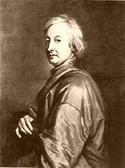 “Absalom and Achitophel,” John Dryden’s satirical allegory, disproves the idea that works of political propaganda can never be literature.
“Absalom and Achitophel,” John Dryden’s satirical allegory, disproves the idea that works of political propaganda can never be literature.
The year was 1681. England’s King Charles had sired children hither and yon but had no legitimate heir. His Catholic brother, James, stood next in line to the throne.
As fear of an alleged “Popish Plot” to kill the king and usher in Catholic rule swept the land, Charles rebuffed Protestant entreaties that he exclude his brother from succession and appoint instead his illegitimate Protestant son, also named James, Duke of Monmouth, his successor. The Earl of Shaftesbury, the Protestant ringleader, sat in prison awaiting trial on charges of high treason.
Whether Dryden penned “Absalom and Achitophel” of his own accord or at the king’s request is unclear.
But to bolster the monarch’s position, he recast Charles, Monmouth, and Shaftesbury as players in the tragic Biblical tale of King David’s most beloved son, Absalom — a story as universally familiar in Dryden’s day as the image of Pontius Pilate washing his hands is in ours. Maybe more familiar.
Realizing the slim likelihood of converting his adversaries, Dryden makes his intended audience clear in a note to the reader: “if I happen to please the more moderate sort, I shall be sure of an honest party and, in all probability, of the best judges, for the least concerned are commonly the least corrupt.”
The poem is sharp and funny — and even, at the outset, bawdy. (True, it’s no Miller’s Tale, but then accidental cunnilingus doesn’t just… come along every day.) Here are the opening couplets:
In pious times, ere priest-craft did begin,
Before polygamy was made a sin;
When man, on many, multipli’d his kind,
Ere one to one was cursedly confin’d:
When Nature prompted, and no Law deni’d
Promiscuous use of concubine and bride;
Then, Israel’s monarch, after Heaven’s own heart,
His vigorous warmth did variously impart
To wives and slaves: and, wide as his command,
Scatter’d his Maker’s image through the land.
Dryden’s epic is arguably the finest work of poetic satire written in the English language. Though his targets are widespread — he mocks not just the Protestants, but transubstantiation, the priesthood, and even the king — his arrows are precisely aimed. As the editors of The Longman Anthology of British Literature observe, “Absalom and Achitophel” was “read, marked, circulated, and treasured as a masterpiece and a menace.”
Yet the very specificity and allusiveness that give the poem its power render it, unlike Swift’s A Modest Proposal, relatively inaccessible to any contemporary reader lacking knowledge of both 17th century English politics and the Old Testament. Which is almost everyone.
Poor Dryden. The few lines of his quoted in the U.S. today — “Great wits are sure to madness near allied; And thin partitions do their bounds divide” — are often attributed to Shakespeare.
Image of Dryden portrait taken from Representative Poetry Online.